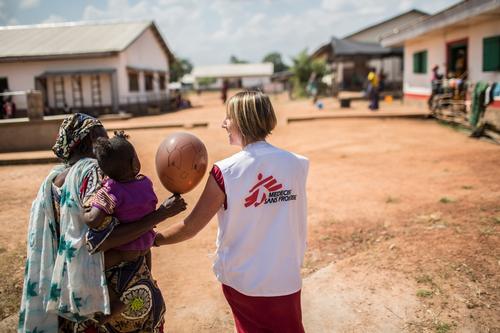The past decade has seen major improvements in people’s ability to access lifesaving HIV treatments – but if you live in Central African Republic (CAR), South Sudan or parts of Yemen, you could be forgiven for thinking nothing has changed. The fact is that in most unstable areas, HIV services remain largely non-existent. People living with HIV/AIDS in conflict zones are victimised twice – first by the virus itself, and second by the breakdown of health services, which can make treatment impossible to come by.
The general perception is that HIV prevalence rates in unstable countries are low – but the reality is that pockets exist where HIV prevalence is as high as 10%. Meanwhile, coverage of antiretroviral (ARV) treatment in these contexts is often below 20%, as so many challenges exist to providing treatment.
In a conflict area or war zone, patients and health workers may be forced to flee their homes due to violence, while shifting frontlines may cut off supplies of drugs. This can have serious health consequences, as HIV infection requires high levels of adherence to treatment to control the disease.
The side effects of conflict – including food insecurity, contaminated water, diseases and the physical and psychological stress of living in a warzone – can all have negative influences on the evolution of the disease.
When displaced people flee across borders, it can also have serious repercussions on their continuity of care. During the conflict in CAR, large numbers of people fled to Chad, Cameroon, Ethiopia and Uganda and settled in temporary refugee camps. With so many competing health priorities, HIV care is still not available in the camps, nor can refugees seek HIV care in the host countries.
But while treating any patient in a conflict setting is difficult, it is not impossible. For the past decade, our teams have been reaching and treating HIV patients caught up in conflict zones.
Key to this has been adapting our activities to the lives of our patients and the specific situations in which they are living, using simplified packages of care and easy-to-use monitoring tools. Our approach is patient-focused, with medication available near the patients’ homes, and prescription refills provided for three to six months at a time. Counselling and patient empowerment also play an important part.
We have also developed a number of innovative strategies, such as ‘runaway packs’ – a supply of drugs that patients can take with them if forced to flee – and transferring patients to clinics in more stable areas. In Boguila, CAR, MSF provides some 500 HIV-positive people with ARV treatment, but recent violence year left more than 200 patients unable to access their medication.
Prior to the conflict in South Sudan, which began a year ago, MSF provided HIV care and treatment in Lankien, Bentiu, Nasir and Leer, with a total of 293 patients on ARV treatment. Forced by violence to flee, our patients were displaced to areas without access to alternative healthcare, and faced serious interruptions to their treatment. Again, runaway packs helped patients continue their treatment even while hiding in the bush.
In Yemen, where violent conflict has intensified since 2011, we have provided treatment to 350 patients. During the unrest, MSF teams gave patients information cards with the phone numbers of MSF staff so that, even when in hiding, they could arrange a meeting and organise to have their drugs delivered.
Our experience shows that difficult conditions should not be an excuse for inaction. We have proved that providing HIV care in conflict zones is possible; now governments, donors and health NGOs need to take up the challenge and do more to meet the health and humanitarian needs of people with HIV/AIDS, improving their access to treatment and ensuring that they have continuity of care.
Despite the successes so far, a great deal more still needs to be done by everyone involved –including MSF – to meet the emergency health needs of people made twice as vulnerable as a result of conflict.
Cecilia Ferreyra is an HIV/TB advisor with the international medical organisation Médecins Sans Frontières/Doctors Without Borders (MSF).



